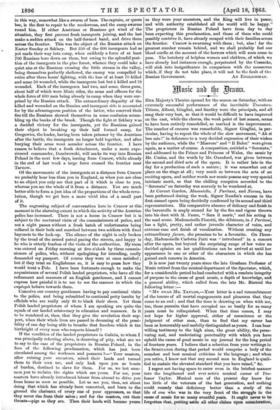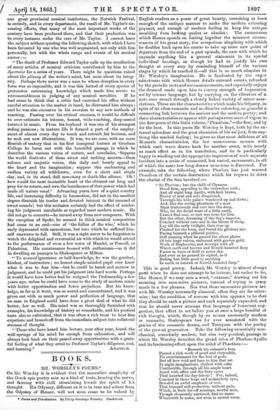:11
uric ai t t groat.
HER Majesty's Theatre opened for the season on Saturday, with an extremely successful performance of the inevitable Trovatore, Titiens, Alboni, Giuglini, and Santley were the principals, and all sang their very best, so that it would be difficult to have improved on the cast, while the chorus, the weak point of last season, seems to have been entirely remodelled, so marked is the improvement. The number of encores was remarkable, Signor Giuglini, in par- ticular, having to repeat the whole of the slow movement, " Ah si ben mio !" in deference to a very decided expression of their wishes by the audience, while the "Miserere" and " Il Balen" were given again, as a matter of course. A composition, entitled a " Serenata," and addressed to the Prince and Princess of Wales, the music by Mr. Cusins, and the words by Mr. Oxenford, was given between the second and third acts of the opera. It is rather late in the day for a production of such a nature ; it was somewhat out of place on the stage at all ; very much so between the acts of an exciting opera, and neither words nor music possess any very special intrinsic merit, so that the chilling reception accorded to the " Serenata" on Saturday was scarcely to be wondered at.
At Covent Garden, Masaniello, I Puritani, and Norma, have been performed during the week, Signor Naudin's success in the first-named opera being decidedly confirmed by its second and third representations. His comparative absence of delicacy and finish in the barcarolle is amply atoned for by the fire and vigour thrown into his duet with M. Faure, " Sara il morir," and his acting in the mad scene. Mademoiselle Fioretti, the deli:tante, in I Puritani, has a light, pretty, and rather juvenile character of voice, and extreme ease and finish of vocalization. Without creating any extraordinary furore, she promises to be a favourite. On Thurs- day, Mademoiselle Carlotta Patti was " introduced" in a concert after the opera, but beyond the surprising range of her voice no decided opinion on her qualifications can be arrived at until her appearance in one or other of the characters in which she has gained such renown in America.
It is now just twenty years since the late Gresham Professor of Music retired from the musical department of the Spectator, which, for a considerable period he had conducted with a resolute integrity of purpose in the cause of good music, a depth of knowledge, and a general ability, which called from the late Mr. Rintoul the following letter :—
"MY DEAR Mn. TAYLOR,—Your letter is a sad remembrancer of the tenure of all mortal engagements and pleasures that they come to an end ; and that the time is drawing on when with me, too, those pursuits that have occupied me so busily for so many years must be relinquished. When that time comes, I may not hope for higher approval, either of conscience or the judgment of other men, than to find that my eareer has been as honourably and usefully distinguished as yours. I can bear willing testimony to the high aims, the great ability, the perse- vering zeal, and undeviating punctuality with which you have upheld the cause of good music in my journal for the long period of fourteen years. I believe that a selection from your writings in the SPECTATOR during that period would comprise a body of the soundest and best musical criticism in the language ; and when you retire, I know not that any second man in England is 'quali- fied to sustain the elevated standard that you have raised," &c.
I regret not having space to enter even in the briefest manner into the lengthened and ever active musical career of Pro- fessor Taylor. Musical men of the present day know far too little of the veterans of the last generation, and nothing could reniedy that deficiency better than a study of the life of one who was in the very front of the struggle in the cause of music for so many eventful years. It ought never to be forgotten that, putting aside all other claims upon consideration, one great provincial musical institution, the Norwich Festival, is entirely, and in every department, the result of Mr. Taylor's un- ceasing efforts, that many of the most important works of the casting have been produced there, and that their production was in every instance under the care of Mr. Taylor. I cannot leave the subject without quoting the following sketch, with which I have been favoured by one who was well acquainted, not only with him personally, but with the whole range and events of his musical career :—
" The death of Professor Edward Taylor calls up the recollection of many articles of musical criticism contributed by him to the Spectator for a series of years. There might be questions raised about the pliancy of the writer's mind, but none about its integ- rity. Perhaps there never was a man to whom deception in every form was so impossible, and it was this hatred of every species of pretension outrunning knowledge which made him severe to unreasonableness in judging of any musical novelties. If he had cause to think that a critic had exercised his office without careful attention to the matter in hand, he distrusted him always ; and he was also excessive in his aversion to any new methods of teaching. Passing over his critical excesses, it would be difficult to over-estimate his intense, honest, wide-reaching, deep-seated interest in music. From his boyhood it was one of his strongest ruling passions ; in mature life it formed a part of the employ- ment of almost every day to touch and retouch his lectures, and to seek out new illustrations. It was, we are sure, with no mere flourish of oratory that in his first inaugural lecture at Gresham College he burst out with the beautiful passage in which he describes the various voices of nature, and concludes, ' Suppose the world destitute of these sweet and melting accents—these solemn and majestic voices, this daily and hourly appeal to the heart and the imagination; suppose this enchanting and endless variety all withdrawn, even for a short and single day, and, in its stead, dull monotony or death-like silence. Oh ! how would the most insensible heart or the obtusest ear long and pray for its return, and own the beneficence of that power which had made all nature vocal.' Advancing years, love of a quiet country life, and increasing difficulty in locomotion, did not in the smallest degree diminish his tender and devoted interest in the concord of sweet sounds; but this seclusion certainly had the effect of render- ing his judgment unreliable as regarded most modern music. He did not go to concerts—he turned away from new composers. With the exception of Spohr, he seemed to think musical composition had come to an end—one of 'the follies of the wise,' which he early deprecated with earnestness, but into which he suffered him- self unawares to fall. Still, it was a sight never to be forgotten to watch the delighted and reverential air with which he would attend to the performance of even a few notes of Handel, or Purcell, or Palestrina. His countenance beamed with enthusiasm—as it did in dwelling on passages in Shakespeare or Milton.
" To avowed ignorance. or half-knowledge, he was the gentlest, kindest, of instructors ; no honest simple-minded pupil ever knew what it was to fear him"—but he could be harsh and narrow in judgment, and he could put his judgment into hard words. Perhaps it would have been better had he resigned the Professorship a few years ago, unless he could have come to the study of modern music with better opportunities and fewer prejudices. But his know- ledge, as far as it went, was so sound and concentrated, and it was given out with so much power and perfection of language, that no man in England could have done a great deal of what he did better, few so well. His mind was so thoroughly furnished with examples, his knowledge of history so remarkable, and his poetical taste also so cultivated, that it was often a rich treat to hear him expatiate and branch off from the immediate subject into collateral streams of thought.
" Those who have heard him lecture, year after year, found the well-springs of his mind far enough from exhaustion, and will always look back on their passed-away opportimitie.s with a grate- ful feeling of what they owed to Professor Taylor's diligence, zeal,































 Previous page
Previous page